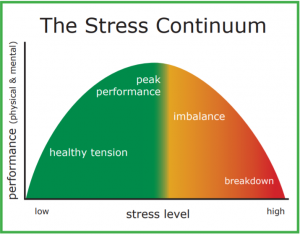Stress
Overview
Stress is a response to a situation, threat, person, or interaction. Stress can be good or bad, and college students may experience stress related to academics, social relationships, lifestyle changes, and more. Stress can impact all aspects of a person’s life, and we see the greatest impact on emotional/mental well-being or physical well-being. Stress may show itself through headaches, rapid breathing, chest pains, irritability, lack of motivation, social isolation, anger, and more. If you find you are experiencing these signs of stress often, it’s important to talk with a primary care physician or mental health professional/counselor. Whether you are experiencing stress related to an upcoming exam, the pandemic, or anything else, here are some ways to manage and cope with stress.
Identifying Stress
Coping with Stress
Stress reduction and management are important tools to help you cope with stress. Stress reduction is specifically incorporating health promotion behaviors to maintain stress levels and become more resilient in stressful situations. Whereas, stress management is a technique to help you deal with a current stressful situation. It’s important to have a routine that incorporates stress reduction on a daily basis and to also have tools when you are in need of stress management. Below are some tips for coping with stress.

